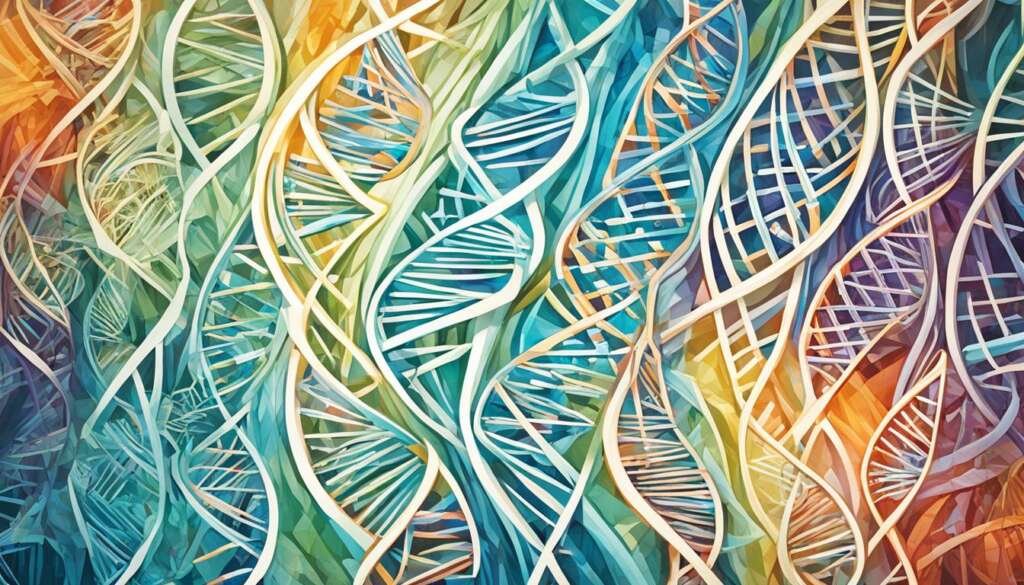Ever pondered if your DNA could unlock your true potential? Delving into genetics reveals how our genetic makeup shapes our self-development. It’s a complex interplay between nature and nurture. Our genes lay the foundation, but our environment and choices shape our journey.
Occassionally I might feature some affiliate links in my articles. If you make a purchase through these links, I may earn a small commission at no extra cost to you. Thanks for supporting me.
Our genetic makeup deeply influences self-development, yet it’s just part of the story. While DNA offers a blueprint, it’s the interaction between genetic and environmental factors that molds us. I find it fascinating how this balance impacts our personalities and talents.
As we delve deeper, we’ll see how a small genetic difference leads to vast human diversity. I’ll navigate through behavioral genetics research, highlighting how our inherited traits and environment combine to form our unique identities.
Understanding the Basics of Genetic Influence on Personality
Genetic makeup is key in shaping our personality and potential for self-actualization. It’s intriguing how our DNA acts as a blueprint for our existence, affecting various life aspects. Let’s delve into the complex link between genetics and personal growth.
The Role of DNA in Shaping Our Traits
Our DNA harbors about 25,000 genes, each playing a part in crafting our distinct traits. These genes act as biological determinants of self-development, impacting our physical traits and behavioral patterns. The intricate interaction of multiple genes lays the groundwork for our personality traits.
Nature vs. Nurture: Finding the Balance
While heredity is crucial for self-improvement, it’s not the sole factor. The nature versus nurture debate highlights that our environment also shapes us. Genetic predispositions blend with our experiences, forming a unique mix that defines our paths to self-actualization.
Instincts and Inherited Behaviors
Instincts are innate patterns of behavior crucial for our survival and reproduction. These inherited behaviors underpin our personality, though their intensity can differ due to genetic variations. Some genes may boost certain traits, while others might dampen them, resulting in a broad range of traits within our species.
Grasping the genetic influence on personality sheds light on the intricate interplay between our DNA and environment. This insight enables us to leverage our innate strengths and navigate potential limitations in our self-improvement journey.
The Influence of Our Genetic Makeup on Self-Development
I’ve always been intrigued by the complex relationship between genetic and environmental factors in personal growth. Our genes lay the groundwork for our potential, yet they are not the sole determinants of our development. The ongoing debate between nature and nurture underscores the dual role of our DNA and life experiences in shaping who we are.
Our genetic makeup significantly influences our cognitive abilities, personality traits, and self-awareness. For instance, certain animals, such as chimpanzees and dolphins, exhibit self-recognition in mirrors, indicating a genetic predisposition towards self-awareness. This phenomenon suggests that genetic factors play a role in the development of self-awareness across different species.

Social cognition, the capacity to understand how our actions impact our relationships, is another area where genetics and human potential intersect. Observing chimpanzees, we see they possess this skill, hinting at its evolutionary origins. While our genes establish a foundation, our experiences and choices significantly shape the development of these abilities.
| Trait | Genetic Influence | Environmental Influence |
|---|---|---|
| Cognitive Abilities | High | Moderate |
| Personality | Moderate | High |
| Self-Awareness | Moderate | High |
| Social Cognition | Moderate | High |
Grasping the interplay between our genetic predispositions and environmental factors is crucial for personal growth. By acknowledging our innate strengths and focusing on areas for improvement, we can leverage our potential and foster significant self-development.
Behavioral Genetics: Unraveling the Mystery of Personality
Behavioral genetics offers deep insights into the genetic makeup of our personalities. It’s akin to uncovering nature’s blueprint for our personal evolution. Researchers employ various methods to delve into the complexities of our personalities.
Family Studies: Tracing Traits Through Generations
Family studies examine the heritability of traits across generations. They shed light on which personality traits might be genetically predisposed. For instance, a propensity for adventure among family members could be genetically rooted.
Twin Studies: Comparing Genetic Similarities
Twin studies are particularly insightful. They contrast identical twins, who share identical genetic makeup, with fraternal twins, who share only half their genes. This approach helps delineate the genetic from environmental influences on personality.
Adoption Studies: Separating Nature from Nurture
Adoption studies serve as a real-world experiment. They analyze individuals raised by non-biological parents. This method aids in distinguishing genetic from environmental contributions to personality.
These studies provide valuable insights into the interplay between genetics and environment in shaping our personalities. They suggest that both our genetic makeup and life experiences play pivotal roles in our development. This knowledge holds promise for enhancing self-understanding and personal growth.
Epigenetics and Self-Actualization: Beyond the Genetic Blueprint
Epigenetics and self-realization are revolutionizing our understanding of human potential. They reveal how our environment and choices can shape our genes, offering a path to growth beyond our inherited traits.
Environmental Factors That Activate Genes
Our genes are not predetermined. Epigenetic modifications can turn genes on or off, without changing the DNA sequence. Factors like stress, diet, and social interactions are key in this process. They can mold our personalities and behaviors over time.
The Power of Lifestyle Choices in Gene Expression
Our daily habits significantly impact our genetic expression. Activities like exercise, diet, and sleep patterns can shape how our genes work. This affects everything from our mood to cognitive abilities. Such knowledge empowers us to make choices that support our health and growth.
Harnessing Epigenetics for Personal Growth
Genomic insights into self-discovery guide us in personal development. By understanding how our environment and choices influence our genes, we can craft strategies for self-improvement. This might include:
- Practicing mindfulness to reduce stress-induced epigenetic changes
- Adopting a nutrient-rich diet to support positive gene expression
- Engaging in regular physical activity to enhance cognitive function
By embracing these principles, we can actively participate in our self-actualization journey. This unlocks our full potential through the dynamic interaction of genetics and environment.
Conclusion
I’ve delved into the intricate relationship between genetic makeup and self-development. This interplay between nature and nurture defines our identities. Our genes establish a foundation, yet our environment and choices significantly influence us.
Behavioral genetics reveals how certain traits are hereditary. Through twin and adoption studies, we’ve observed the genetic impact on self-development. However, epigenetics suggests that lifestyle choices can modify gene expression.
Grasping the interplay between genes and human potential is crucial. We are more than our DNA. By acknowledging our genetic predispositions and making informed choices, we can evolve. This realization is empowering, suggesting we can craft our narratives with both genetic and environmental factors in mind.
Ultimately, our path to self-development is distinct. It’s a blend of innate traits and the life we construct. By accepting both aspects, we unlock avenues for personal growth and satisfaction.
FAQ
How much do genes influence personality traits and behaviors?
Genes significantly shape our personality and behaviors. Despite a 99.9% DNA similarity among humans, the remaining 0.1% leads to distinct traits. This difference is due to the complex interaction of multiple genes.
Do environmental factors also play a role in personality development?
Yes, the environment interacts with our genetic makeup to shape our traits. This interaction between nature and nurture is intricate. Genes lay the groundwork, while the environment molds how these genes express themselves.
What research methods do behavioral geneticists use to study genetic and environmental influences on human behavior?
Behavioral genetics employs family, twin, and adoption studies. These methods help dissect the roles of genetics and environment in personality development.
What is epigenetics, and how does it relate to self-development?
Epigenetics explores how environmental factors can turn genes on or off without altering DNA. Lifestyle choices can affect gene expression, influencing our personality and behavior. This field sheds light on personal growth and self-actualization.
Can we overcome genetic limitations through environmental factors?
Genes set the stage for our traits, but the environment can shape their expression. By grasping epigenetics and making lifestyle choices, we might enhance our genetic expression and personal growth.
How can knowledge about genetic influences and epigenetics help with self-development?
Understanding genetic and epigenetic factors aids in making informed choices for personal growth. Recognizing both genetic predispositions and environmental impacts helps individuals tap into their full potential for self-development.
Source Links
- https://www.ncbi.nlm.nih.gov/pmc/articles/PMC4685725/
- https://www.nature.com/scitable/knowledge/library/both-environment-and-genetic-makeup-influence-behavior-13907840/
- https://opentextbc.ca/introductiontopsychology/chapter/11-3-is-personality-more-nature-or-more-nurture-behavioral-and-molecular-genetics/

